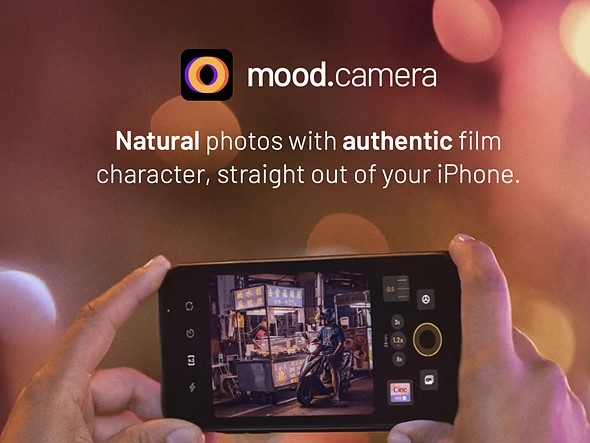
 |
| Image: mood.camera |
A new camera app that wants to offer a film-like experience is now available. The mood.camera app (iOS only) targets fans of analog photography and consists of 14 film-like filters. I was given early access to the app to test it out and see if it offers anything different from similar apps on the market.
There’s been a resurgence in analog photography recently. Though many desire the look of film, they don’t necessarily enjoy the process (and time) of using analog cameras. mood.camera aims to bridge the gap between film and digital by offering filters that emulate film stocks such as Kodak Portra, CineStill and Chrome.
Inside the app, users can imitate a change in ISO (ranging from 100 to 3200) and will notice less detail and more grain the higher you go. There’s also a digital tonal range dial that impacts the amount of contrast and saturation in an image.
 |
| Image: Dan Ginn (made with mood.camera). Filter: Chrome |
This isn’t the first app trying to emulate the look of film photography. Other apps, such as 1998 Vintage Camera and VSCO, offer filters that provide a classic look, as does Hipstamatic, one of the first smartphone apps within this niche.
What sets mood.camera apart is how it provides an analog-esque process to image making. Whereas other apps provide a live preview of filters and simulations, mood.camera doesn’t.
The app’s developer said the intention was to “mirror the classic film camera experience.” To see how the images turn out, you must view the photos in Apple’s Photos app.
 |
| Image: Dan Ginn (made with mood.camera). Filter: Portra |
Some obvious features are missing in the app. There’s no portrait mode, which the developer says is because “Apple does not let you capture ProRaw and depth data.” There’s no night mode either, which the developer claims is possible to add but isn’t interested in doing so at this time.
 |
| Image: Dan Ginn (made with mood.camera). Filter: Chrome |
Having used the app for a week, it did bring a new sense of enjoyment to mobile photography. I liked not having a live preview of my images. Its absence allowed me to worry less about the outcome and focus more on the process of creating photographs.
There was a distinct difference in each of the filters, and while they’ll never be 100 percent like stock film, they’re close. Unlike some apps I have tried before, I found it easy to navigate through the different filters in mood.camera, and the app itself was quick and responsive.
 |
| Image: Dan Ginn (made with mood.camera). Filter: Cine |
If you want to adapt your smartphone photography workflow and like the classic look, then mood.camera is worth trying. There’s a seven-day free trial available before committing to a paid subscription.
mood. camera is now available on the App Store and costs $1.99 per month or $14.99 as a one-time purchase. A free trial is available to evaluate the app.






